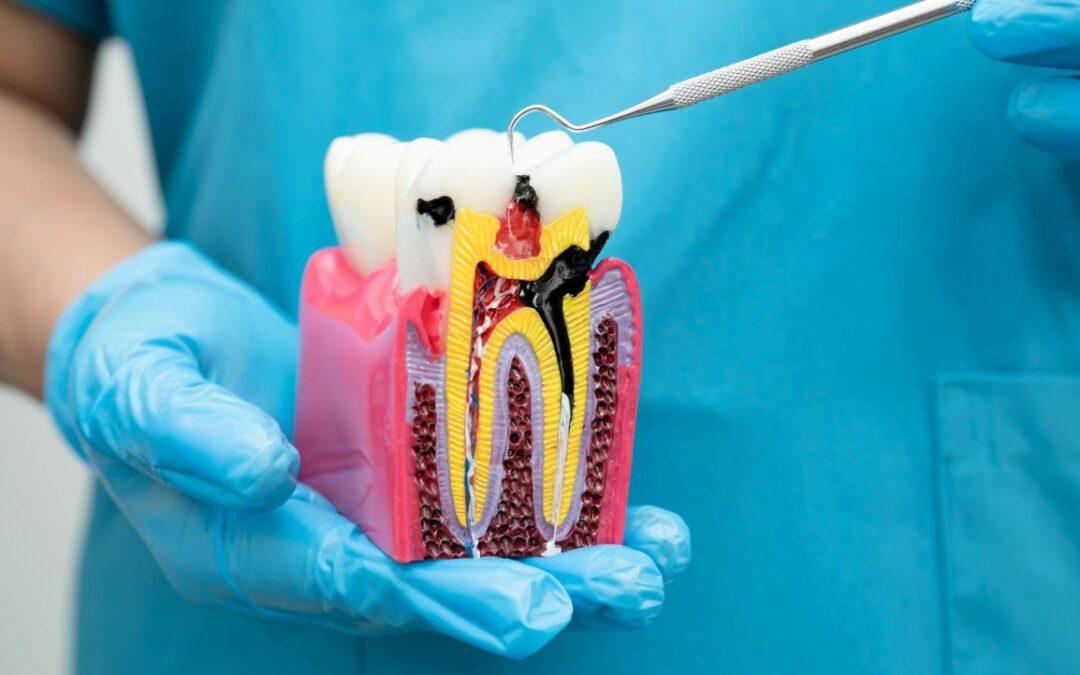“You have a cavity” –a dreaded phrase that nobody wants to hear during their dental visit. Whether it’s childhood dental anxieties or past experiences with fillings, the concern is understandable. Thankfully, conquering cavities is within reach. By understanding the causes, recognizing the signs, and adopting simple habits, you can protect your smile. Let’s explore the world of cavities, covering everything from cavity prevention to cavity treatment, and unlock the secrets to a healthier, cavity-free future.
What Causes a Cavity?
Cavities can be the result of multiple factors. However, all cavities are caused by the same overarching problem: tooth decay. Tooth decay is when your teeth slowly break down. It happens when plaque, a clear, sticky film, stays on your teeth for too long. Contributing factors for tooth decay include:
- Consumption of sugary foods
- Intake of starchy foods
- Inadequate oral hygiene practices
When teeth are not properly cleaned, oral bacteria thrive on residual sugars and starches, leading to the formation of plaque. The plaque begins to deplete minerals from tooth enamel, the tooth’s protective outer layer. Once enamel integrity is compromised, acids and bacteria penetrate the softer dentin layer, progressing further into the tooth. This progression continues toward the sensitive pulp (nerve), ultimately leading to discomfort and pain.
Symptoms of a Cavity
The signs or symptoms of a cavity vary with size and location. Early-stage cavities may present no noticeable signs, while advanced decay exhibits more prominent symptoms, posing a greater threat to oral health and comfort. Typical signs and symptoms of cavities include:
- Holes or pits on tooth surfaces
- Heightened sensitivity to extreme temperatures
- Unexplained or spontaneous toothaches
- Pain during chewing or biting
- Varying degrees of pain when eating or drinking
- Changes in tooth coloration
Individuals may experience one or a combination of symptoms. Regardless of severity or frequency, these indicators signify a dental problem requiring professional attention. Seek immediate dental care if these symptoms arise.
How to Handle Your Cavity Before You See the Dentist
You might have to wait a while before you can see a dentist for your cavity. That means you’ll need to deal with the pain and sensitivity until then. Luckily, you can do some things to make the wait more bearable.
First, ask your doctor if you can take over the counter pain medicine to help with the pain. Your dentist might even recommend a certain medication. You can also try using toothpaste and mouthwash made for sensitive teeth.
Also, try to avoid things that make your tooth/teeth hurt more. Brush your teeth with warm water instead of cold. Stay away from foods and drinks that make your tooth/teeth sensitive. That means no hot, cold, acidic, or sugary items.
Treating a Cavity
Treatment for cavities ranges from simple fillings to complex root canals, depending on the severity of the decay.
- Fillings, made of materials like composite or amalgam, restore minor cavities.
- Crowns, used for more significant damage, cover the entire tooth.
- When the pulp is involved, a root canal is necessary, which involves cleaning and sealing the tooth’s interior. A crown is often required following a root canal.
How to Prevent a Cavity
It’s significantly easier to prevent cavities than it is to treat them after they’ve developed. And the good news is, prevention is simpler than you might imagine. While no method guarantees complete immunity, following fundamental oral hygiene practices will drastically reduce your risk and allow for early detection by your dentist.
Your primary defenses against cavities are:
- Brushing thoroughly for two minutes, twice daily
- Flossing at least once daily, ideally after meals
- Scheduling dental checkups every six months
You can further strengthen your teeth against cavities by adding supporting measures, like using a soft-bristled toothbrush and eating a healthy diet.
Prevent and Treat Cavities with University General Dentists
Maintaining a healthy smile is within reach through understanding how a cavity forms and practicing consistent prevention. Don’t let concerns hold you back from proactive dental care. Schedule your comprehensive check-up and cleaning with University General Dentists today for personalized guidance. If you’re experiencing discomfort, contact us immediately to book an appointment. We’re dedicated to helping you achieve and maintain optimal oral health. Visit our website or call now to learn more about our services and schedule your next visit!

